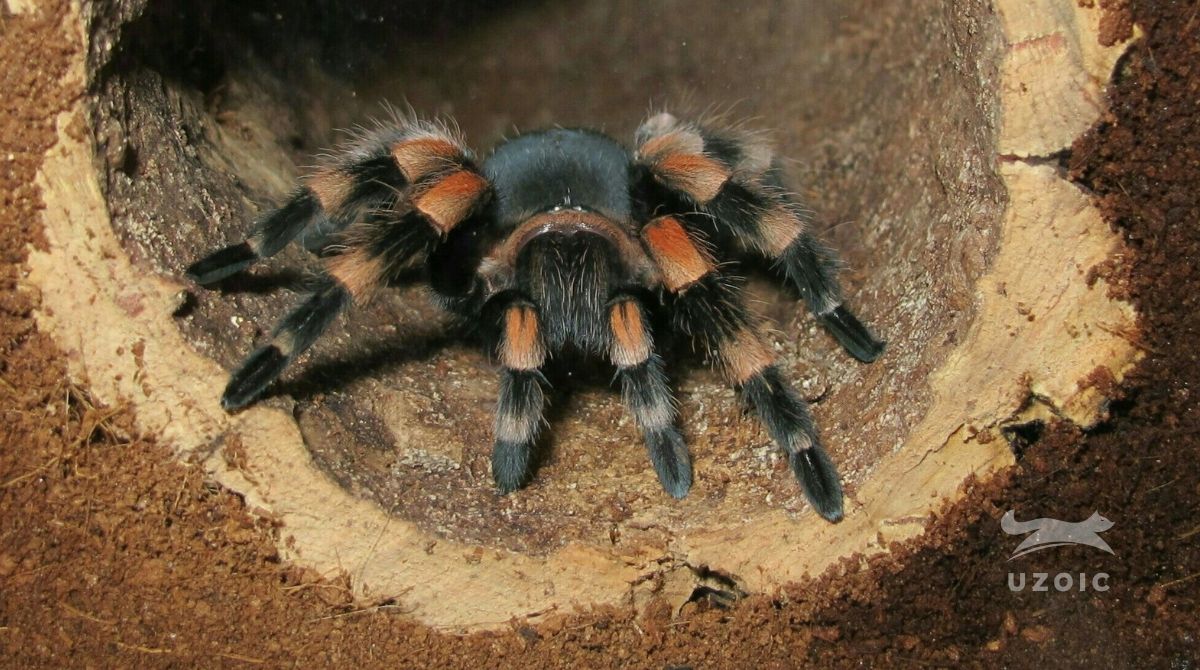Tarantulas are opportunistic predators and will eat just about anything they can catch. But do they eat cockroaches?
The answer is yes, Tarantulas will eat cockroaches. In fact, they are known to be quite fond of them. They are 100% carnivores meaning they will eat only animal-type food and prey on a variety of insects, including cockroaches.
Tarantula’s are natural predators, and they use their hunting skills to capture food.
When a Tarantula catches a cockroach, it will wrap it up in its legs and start to eat it (or rather drink it!) after the digestive enzymes have liquified it. The whole process can take a few minutes to a few hours, depending on the size of the cockroach.
If you have ever seen a Tarantula eat, you know that they are not the most delicate creatures. They will rip their prey apart and devour it in liquid form, leaving nothing behind.
Cockroaches are not the only thing that Tarantulas will eat; they consume crickets, grasshoppers, moths, and even small rodents.
So, if you have a Tarantula as a pet, you should not worry about them going hungry. They will have no problem finding something to eat.
In this article, we will explore the dietary habits of Tarantulas and see what types of cockroaches can the Tarantula eat.
Table of Contents
Do Tarantulas Eat Cockroaches?
Yes, they do! Tarantulas are pretty fond of cockroaches in the wild and will eat them if given a chance. Tarantulas prey on various small insects and other invertebrates, making cockroaches a natural choice for these arachnids.
Additionally, tarantulas are typically better equipped to tackle a huge, hardy insect like the cockroach.
However, you should note that the specific diet of tarantulas can vary significantly depending on their diet, where they live, and what prey happens to be available at any given time.
Therefore, while some tarantulas choose cockroaches over other foods, this may not always be the case.
Some Tarantulas are picky, and many go through phases of what they will eat.
Cockroaches are an important part of their diet, and they provide the Tarantula with a good source of protein.
Tarantulas will typically eat cockroaches that are small to medium in size.
The larger cockroaches can be too much for a tarantula to handle, and they may not be able to eat them.
Are Cockroaches Good For Tarantulas?
Cockroaches are an excellent source of food for tarantulas. They provide the Tarantula with much-needed protein, minerals, and other nutrients, and they are also a good source of fat.
Tarantulas need fat to help them keep their energy levels up, and cockroaches can provide this for them.
Additionally, cockroaches are a good source of chitin, which is a source of dietary fiber. Their exoskeleton is made up of chitin.
While cockroaches are definitely good for tarantulas, it is important to remember that they should not be the only thing that these arachnids eat.
Tarantulas need a well-rounded diet to stay healthy, and cockroaches should only be a part of this diet.
If you are feeding your tarantula cockroaches, be sure to also offer them other gut-loaded insects and food items as well. This will help ensure that your Tarantula gets all the nutrients and energy it needs to stay healthy and happy.
Also, do not overfeed fatty insects to your Tarantulas like the roaches and worms.
Tarantulas can get obese, and it will slow them down considerably—it is not a pleasant sight to watch an obese Tarantula with a bloated abdomen struggle with hunting its prey.
What Types Of Cockroaches Does A Tarantula Eat?
There are a few different species of cockroaches that Tarantulas will eat. The most common type of cockroach that Tarantulas will eat is the American Cockroach.
This type of cockroach is small to medium in size and is found in many homes. They are also a common sight in many restaurants.
Another type of cockroach that Tarantulas will eat is the German cockroach. It is smaller than the American Cockroach, and they are often found in homes and apartments.
Tarantulas are not particular about what type of cockroach they eat, and they will consume just about anything that they can catch.
Cockroaches are a good source of food for Tarantulas, and they provide the Tarantula with essential nutrients.
Tarantulas will also eat other insects, such as crickets, beetles, and moths.
Many internet sources mention that you can feed them three specific roaches: Dubia roaches, Turkestan roaches, and Madagascar hissing roaches. So it is safe to feed them to your pet Tarantula.
But many users have reported that sometimes their Tarantula does not feed on these roaches even if one is present in their surroundings.
Can I Feed House Cockroach To Tarantula?
Avoid feeding them common house cockroaches as we don’t know where they have been. They can be carrying a host of diseases and can make your Tarantula sick.
So instead, you can feed them with some freeze-dried cockroaches or live feeder dubia roaches. These are available at your nearest pet store or online.
Can I Feed Wild Insects And Cockroaches from my Farm to my Pet Tarantula?
While you can feed them to your pet, you should not do it. Wild insects from the farm, including roaches, may carry various insecticides on their exoskeleton that can prove fatal for your Tarantula.
So avoid feeding them wild insects and cockroaches from your farm. Instead, opt for live dubia roaches meant for feeding or freeze-dried roaches packed with nutrients.
However, it is important to remember that Tarantulas need a well-rounded diet to stay healthy.
Conclusion
We hope this article has helped you to understand a little bit more about whether Tarantulas eat cockroaches or not.
As you can see, they definitely do! Cockroaches are a good source of food for these arachnids, and they provide the Tarantula with the nutrients it needs to stay healthy.
Just be sure to offer your Tarantula a well-rounded diet that includes other gut-loaded insects and food items. It will help ensure that your Tarantula stays healthy and happy. Thanks for reading!


